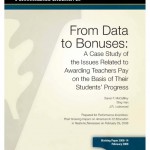From Data to Bonuses: A Case Study of the Issues Related to Awarding Teachers Pay on the Basis of Their Students’ Progress
 A key component to the new wave of performance-based pay initiatives is the use of student achievement data to evaluate teacher performance. As greater amounts of student achievement data are being collected, researchers have been developing and applying innovative statistical and econometric models to longitudinal data to develop measures of an individual teacher’s contributions to his or her students’ learning. These models are generally referred to as value-added models. A few studies have compared subsets of the various value-added estimators of teacher performance, but few have considered the alternative explicitly in the context of using the estimates as the basis of performance-based pay. Moreover, there has been little consideration of aspects of the process of generating performance measures and using them to award teacher bonuses or make other compensation decisions. This paper directly addresses these issues, as it describes the process of taking a large administrative database of student test scores and class assignments and turning it into bonus decisions for teachers. The choices to be made at each step of the process are illuminated with careful consideration of impact on the types of teachers who receive awards, the choice of performance measures, and decision rules for awarding bonuses.
A key component to the new wave of performance-based pay initiatives is the use of student achievement data to evaluate teacher performance. As greater amounts of student achievement data are being collected, researchers have been developing and applying innovative statistical and econometric models to longitudinal data to develop measures of an individual teacher’s contributions to his or her students’ learning. These models are generally referred to as value-added models. A few studies have compared subsets of the various value-added estimators of teacher performance, but few have considered the alternative explicitly in the context of using the estimates as the basis of performance-based pay. Moreover, there has been little consideration of aspects of the process of generating performance measures and using them to award teacher bonuses or make other compensation decisions. This paper directly addresses these issues, as it describes the process of taking a large administrative database of student test scores and class assignments and turning it into bonus decisions for teachers. The choices to be made at each step of the process are illuminated with careful consideration of impact on the types of teachers who receive awards, the choice of performance measures, and decision rules for awarding bonuses.
To read this paper, please click here
Connect with Vanderbilt
©2026 Vanderbilt University ·
Site Development: University Web Communications